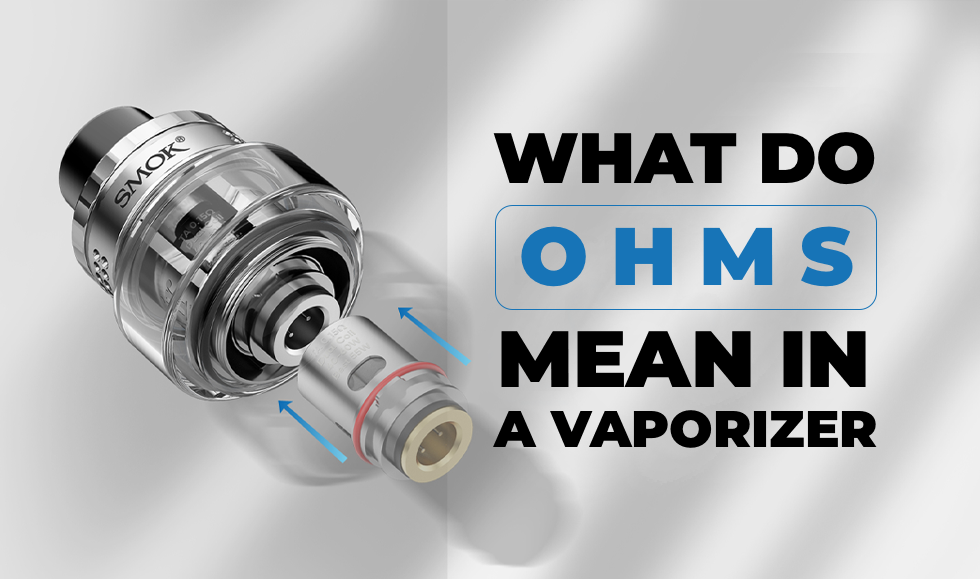In a vaporizer, Ohms (Ω) refer to the measurement of electrical resistance in the device's heating element, typically a coil or atomizer. Understanding Ohms is important for vapers because it can affect the vaping experience, including the amount of vapor produced and the flavor of the e-liquid.
What are Coils?
Vape coils are vital components of vaping devices. They play a crucial role in heating the e-liquid in order to produce the vapor that users inhale.
Here's a more detailed explanation of what vape coils are and how they work:
- Construction: Vape coils are typically made of resistance wire, most commonly kanthal, nichrome, stainless steel, or nickel. This wire is tightly wound to form a coil shape. The resistance wire's properties determine the coil's resistance, which affects the device's overall performance.
- Heating Element: When an electrical current from the battery is passed through the coil, it becomes an electrical resistor and generates heat due to its resistance. This heat is what vaporizes the e-liquid.
- Wicking Material: In addition to the coil, there’s a wicking material, often organic cotton, silica, or a synthetic material, that is threaded through the coil or placed around it. This wicking material absorbs the e-liquid and brings it into contact with the heated coil.
- Vaporization Process: As the coil heats up, it vaporizes the e-liquid soaked in the wicking material. This vapor is then inhaled by the user when they draw on the mouthpiece of the vaping device.
- Coil Types: Vape coils come in various types, including single coil, dual coil, triple coil, and more. Dual and triple coil setups, for example, provide more surface area for heating and can produce larger vapor clouds but may require more power and e-liquid.
- Lifespan: Vape coils have a limited lifespan and will eventually degrade due to factors like heat, oxidation, and build-up of residue from e-liquids. When a coil becomes less efficient or starts to produce a burnt taste, it's time to replace it.
- Customization: Advanced vapers often customize their vaping experience by building their coils or selecting coils with specific resistance levels and coil materials to achieve the desired performance and flavor.
What are Ohms?
Ohms (symbol: Ω) are the unit of electrical resistance in the International System of Units (SI). Resistance is a property of materials that describes their ability to impede the flow of electric current. In simple terms, it's a measure of how difficult it is for electricity to pass through a conductor.
In a vaporizer, this resistance is primarily found in the heating coil or atomizer. The higher the ohm rating, the more resistance there is to the flow of electricity, and the lower the ohm rating, the less resistance there is.
How Many Ohms are in a Standard Vape?
The resistance (measured in ohms) of a standard vape coil can vary depending on the type of vaping device and the specific coil being used. Vape coils are available in a range of resistances to cater to different vaping styles and preferences.
Typically, you will find vape coils with resistances in the following ranges:
- Sub-Ohm Coils: These coils have a resistance of less than 1 ohm (hence the term "sub-ohm"). They are often used in high-wattage devices and are known for producing large clouds of vapor. Sub-ohm vaping is popular among cloud chasers and those who enjoy direct-to-lung (DTL) inhales. The resistance of sub-ohm coils can vary, with common values like 0.2 ohms, 0.4 ohms, or 0.6 ohms.
- Standard or Mid-Ohm Coils: These coils typically have resistances ranging from 1 ohm to 1.5 ohms. They are suitable for lower-wattage devices and are often used for mouth-to-lung (MTL) vaping, which replicates the sensation of smoking traditional cigarettes.
- High-Ohm Coils: Have resistances greater than 1.5 ohms and are mainly used in MTL vaping setups. They provide a tighter draw and are often preferred by vapers who want a vaping experience that closely resembles smoking.
It's important to note that the specific resistance of a vape coil will be marked on the coil itself or in the product's packaging. Always ensure that you are using the appropriate coil resistance for your vaping device, as using the wrong resistance can lead to unsatisfactory performance or safety issues.
Additionally, the choice of e-liquid and wattage settings can also affect your vaping experience, so it's a good idea to follow the manufacturer's recommendations for your particular device and coil.
High Ohms vs. Mid Ohms vs. Low Ohms
Now, here’s where things get even more interesting:
- High-Ohm Coils: Coils with higher resistance (usually above 2 ohm) are often used in mouth-to-lung (MTL) vaping setups. These coils require less power and tend to produce less vapor, but can provide a smoother, more cigarette-like draw.
- Mid-Ohm Coils. These have a mid-range resistance (1-2 ohms) and provide a balanced experience with decent vapor production and flavor. They’re suitable for most vapers and are often used in standard or adjustable wattage devices.
- Low-Ohm Coils: Coils with low resistance (typically below 1 ohm) are often referred to as "sub-ohm" coils. These coils allow for a higher current to pass through and tend to produce more vapor and warmer temperatures. Sub-ohm vaping is popular among cloud chasers and those who prefer a direct lung hit.
Also, we want to mention that the resistance of the coil (ohms) and the power or wattage applied to it are interrelated. When using a variable wattage or power mode on your vaporizer, you can adjust the wattage to find the right balance between heat and vapor production based on the coil's resistance. Lower-ohm coils typically require higher wattages, while higher-ohm coils work well with lower wattages.
Choosing the Correct Ohms
Choosing the correct resistance (measured in ohms) for your vaping setup is an important aspect of getting a satisfying and safe vaping experience. The resistance of the coil in your atomizer or tank affects several factors, including the amount of vapor produced, the flavor, and the power requirements.
Here are some guidelines to help you choose the right ohms for vaping:
- Understand Ohm's Law: Ohm's Law (V = I x R) is a fundamental principle in vaping. It relates voltage (V), current (I), and resistance (R). When you change the resistance (ohms) of your coil, it can affect the voltage and current your device delivers.
- Consider Your Vaping Style: Different resistance levels are suited to different vaping styles, as we touched upon earlier.
- Battery and Mod Compatibility: Ensure your device is compatible with the resistance you choose. Sub-ohm coils require a device with the power output to handle them, while high-resistance coils work well with lower-wattage devices.
- E-Liquid Nicotine Strength: Your choice of coil resistance can affect the throat hit and nicotine absorption. Lower-resistance coils can provide a stronger throat hit, while higher-resistance coils may require higher nicotine concentrations to achieve the same effect.
- Experiment: The "correct" ohms for vaping can vary from person to person, depending on personal preference. It's a good idea to experiment with different resistance levels to find what suits you best in terms of vapor production, flavor, and throat hit.
- Safety: Always prioritize safety when choosing coil resistance. Ensure your batteries can handle the power demands of your setup, and never exceed the recommended wattage for your coil. Overheating or overloading your battery can be dangerous.
Final Ohms Thoughts
As you can see, ohms in a vaporizer refer to the resistance of the heating coil or atomizer, and they have a vital part in determining the vaping experience, including vapor production, flavor, and the type of draw you prefer. It's essential to choose coils with the right ohm rating for your vaping style, and to use them within the recommended wattage range for safety and optimal performance. Also, understand Ohm's Law and consult your device's manual to make informed decisions about coil resistance and vaping settings.






1 comment
Vardan
Very informative. Thank you!